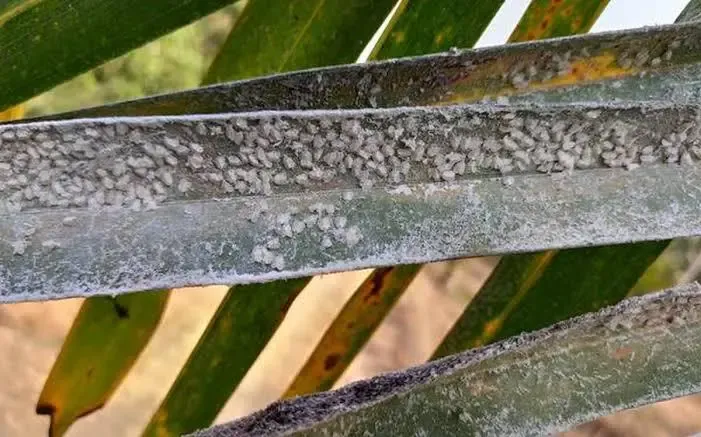Tamil Nadu Agricultural Department Acts on Whitefly Crisis Affecting 1.9 Lakh Acres of Coconut Farms

Synopsis
Key Takeaways
- 1.9 lakh acres of coconut farms affected by whitefly.
- Only natural pest management methods should be used.
- 330 awareness camps conducted for farmers.
- Research supports effective whitefly management strategies.
- Encarsia formosa may help control the infestation.
Chennai, April 8 (NationPress) The Tamil Nadu Agriculture Department is implementing urgent strategies to combat a significant whitefly infestation that has impacted 1.9 lakh acres of coconut farms in the state.
Of the 12 lakh acres dedicated to coconut cultivation in Tamil Nadu, an estimated 1.9 lakh acres have been affected by the rugose spiraling whitefly, an invasive pest known for its rapid proliferation.
These pests secrete a dense sap on leaf surfaces, which hampers plant growth and jeopardizes coconut production.
Officials from the Agriculture Department have stressed that only natural and integrated pest management techniques can successfully manage this infestation.
The Union Government’s Department of Agriculture has also cautioned against the use of chemical pesticides, indicating that they might worsen the whitefly situation.
To educate farmers and enhance awareness, the state has organized 330 camps across various districts.
A collaborative field study by researchers from the Central Plantation Crops Research Institute (CPCRI) in Kasaragod, Kerala, the Tamil Nadu Agricultural University (TNAU), and the state's Horticulture Department led to the execution of various control strategies last year, which proved effective in limiting the spread.
Research conducted by the Agriculture Department has identified several efficient methods for managing the whitefly population, including the installation of light traps (one per hectare), utilization of yellow sticky traps (20 per acre), release of Encarsia parasitoids (100 per plantation), deploying green lacewing insects (400 per acre), spraying a 0.5 percent neem oil solution, and power-spraying water on the undersides of coconut leaves.
Meanwhile, farmers in Dharmapuri district, where coconut farming spans around 5,578 hectares, have expressed concerns regarding the increasing presence of whiteflies.
They have requested the Horticulture Department to intensify awareness initiatives and provide biological control agents such as Encarsia formosa, a parasitic wasp known for its effectiveness against whiteflies.
“A coconut tree can grow up to 50 feet, making traditional pest control methods ineffective,” shared K.R. Muthumaran, a farmer from Pappireddipatti.
“We need Encarsia mites to manage the infestation, but they are unavailable in our area. The department must intervene and supply them,” he added.
Agriculture officials stated that they are raising awareness through farmer groups and social media campaigns. They have also recommended regular water spraying beneath the leaves of saplings and young trees up to five years old.
Additionally, a mixture of castor oil and water has been proposed as a practical solution, though it is primarily suitable for younger plants.
aal/rad









